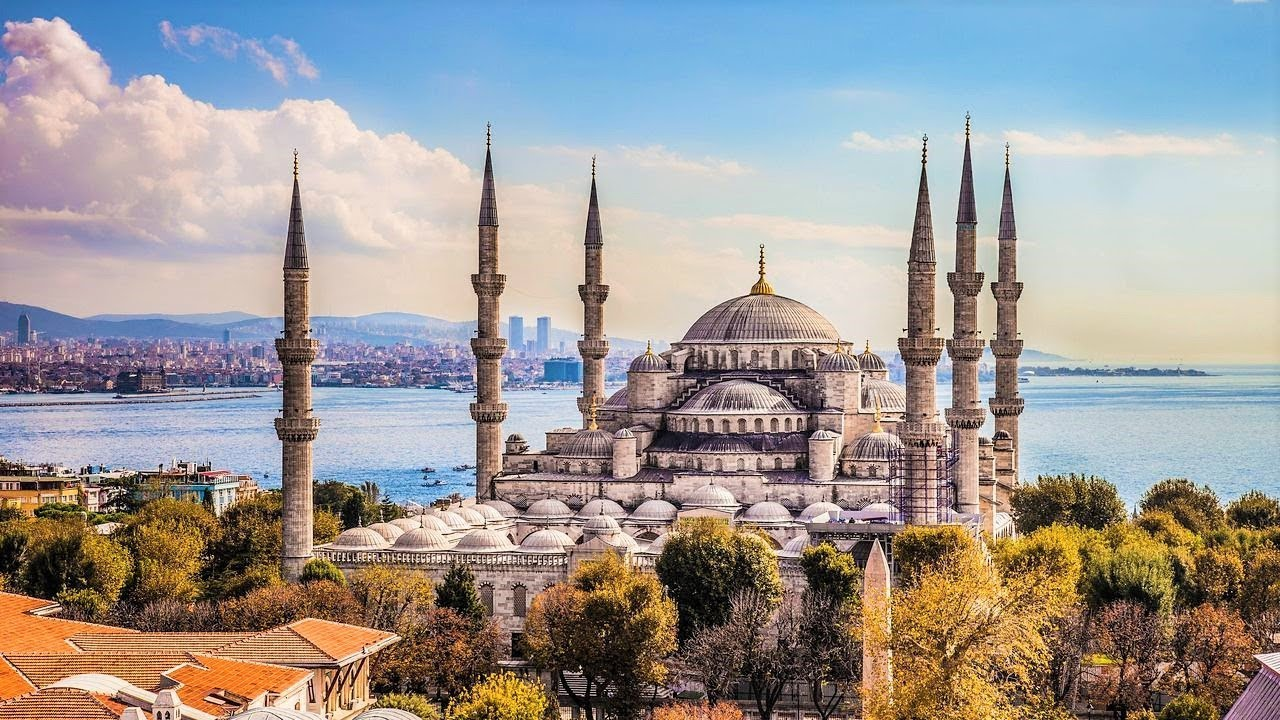Turkey, a nation straddling both Europe and Asia, is a captivating country rich in history, culture, and natural beauty. Known for its diverse landscapes, ancient ruins, and vibrant cities, Turkey serves as a bridge between the East and the West. Its unique position has made it a melting pot of civilizations, where various cultures, religions, and traditions converge. With a heritage that dates back thousands of years, Turkey offers visitors a remarkable journey through time, with experiences ranging from bustling bazaars to serene coastlines.
Table of Contents
Geography
Turkey is located at the crossroads of Europe and Asia, bordered by eight countries: Greece and Bulgaria to the northwest, Georgia to the northeast, Armenia, Azerbaijan, and Iran to the east, and Iraq and Syria to the south. Covering an area of approximately 783,356 square kilometers, Turkey is the largest country in the Middle East and the 37th largest in the world. The country is characterized by its diverse geography, which includes mountain ranges, plains, and coastal regions.
The Anatolian Peninsula, where most of Turkey’s landmass lies, is surrounded by several seas, including the Aegean Sea to the west, the Mediterranean Sea to the south, and the Black Sea to the north. The country’s topography features the rugged Taurus and Pontic mountain ranges, while its central region is dominated by the vast Anatolian Plateau. Turkey is also home to significant natural wonders, such as the stunning Cappadocia region with its unique rock formations and fairy chimneys, as well as the picturesque beaches of the Turquoise Coast.
States of Turkey
Turkey is divided into 81 provinces, not states. Each province is further divided into districts. The provinces serve as the main administrative divisions within the country. Here’s a table listing the 81 provinces of Turkey:
| No | Province | No | Province |
|---|---|---|---|
| 1 | Adana | 42 | Kırıkkale |
| 2 | Adıyaman | 43 | Kırklareli |
| 3 | Afyonkarahisar | 44 | Kilis |
| 4 | Aksaray | 45 | Konya |
| 5 | Amasya | 46 | Kütahya |
| 6 | Ankara | 47 | Malatya |
| 7 | Antalya | 48 | Manisa |
| 8 | Artvin | 49 | Mardin |
| 9 | Aydın | 50 | Muğla |
| 10 | Balıkesir | 51 | Muş |
| 11 | Bilecik | 52 | Nevşehir |
| 12 | Bingöl | 53 | Niğde |
| 13 | Bitlis | 54 | Ordu |
| 14 | Bolu | 55 | Osmaniye |
| 15 | Burdur | 56 | Rize |
| 16 | Bursa | 57 | Sakarya |
| 17 | Çanakkale | 58 | Samsun |
| 18 | Çankırı | 59 | Siirt |
| 19 | Çorum | 60 | Sinop |
| 20 | Denizli | 61 | Sivas |
| 21 | Diyarbakır | 62 | Tekirdağ |
| 22 | Düzce | 63 | Tokat |
| 23 | Edirne | 64 | Trabzon |
| 24 | Elazığ | 65 | Tunceli |
| 25 | Erzincan | 66 | Uşak |
| 26 | Erzurum | 67 | Van |
| 27 | Eskişehir | 68 | Yalova |
| 28 | Gaziantep | 69 | Yozgat |
| 29 | Giresun | 70 | Zonguldak |
| 30 | Gümüşhane | 71 | Bartın |
| 31 | Hakkari | 72 | Bayburt |
| 32 | Hatay | 73 | Karabük |
| 33 | Iğdır | 74 | Kars |
| 34 | Isparta | 75 | Kilis |
| 35 | İstanbul | 76 | Siirt |
| 36 | İzmir | 77 | Sinop |
| 37 | Kars | 78 | Tokat |
| 38 | Kastamonu | 79 | Trabzon |
| 39 | Kayseri | 80 | Tunceli |
| 40 | Kırıkkale | 81 | Uşak |
| 41 | Kırklareli |
History
Turkey has a rich and diverse history that spans thousands of years, marked by the rise and fall of various civilizations. The region has been home to numerous ancient cultures, including the Hittites, Phrygians, and Lydians. One of the most significant historical periods was the establishment of the Hellenistic period following the conquests of Alexander the Great in the 4th century BCE. Cities like Troy and Ephesus emerged as important centers of trade and culture during this time.
The Roman Empire later took control of the region, making it an integral part of their vast empire. After the division of the Roman Empire in the 4th century CE, Turkey became the heart of the Byzantine Empire, with Constantinople (modern-day Istanbul) as its capital. The Byzantine Empire thrived for centuries, preserving Greek and Roman traditions until it fell to the Ottoman Turks in 1453. The Ottoman Empire became one of the most powerful empires in history, ruling over vast territories in Europe, Asia, and Africa for more than six centuries.
The 20th century saw the dissolution of the Ottoman Empire after World War I, leading to the establishment of the Republic of Turkey in 1923 under the leadership of Mustafa Kemal Atatürk. Atatürk implemented sweeping reforms to modernize the country, including the adoption of a secular government and the promotion of education and women’s rights. Today, Turkey is a vibrant democracy that continues to navigate its rich history while embracing modernization and globalization.
Top Ten Most Famous Places to Visit in Turkey
Istanbul
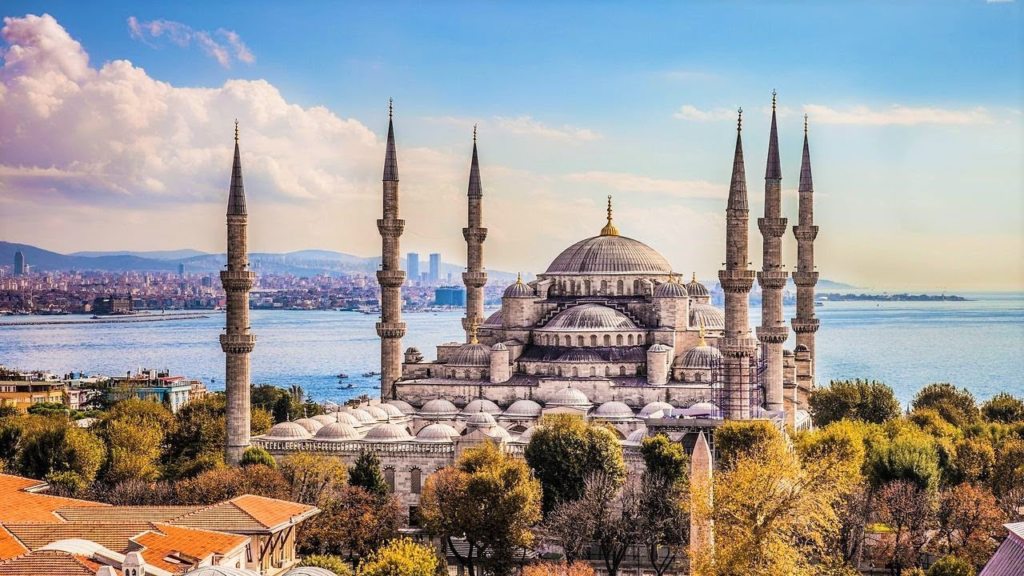
Istanbul, Turkey’s largest city, is a mesmerizing blend of history and modernity. Known for its iconic landmarks, including the Hagia Sophia, Blue Mosque, and Topkapi Palace, Istanbul offers visitors a glimpse into its rich past. The city’s vibrant bazaars, such as the Grand Bazaar and Spice Bazaar, are a treasure trove of spices, textiles, and local crafts. Visitors can also take a leisurely cruise along the Bosphorus Strait to admire the stunning skyline and enjoy the city’s lively atmosphere.
Cappadocia

Cappadocia is renowned for its otherworldly landscapes, characterized by unique rock formations known as fairy chimneys. This enchanting region is famous for its hot air balloon rides, offering breathtaking views of the surreal terrain. Visitors can explore ancient cave dwellings, rock-cut churches, and underground cities, reflecting the region’s rich history. Cappadocia is a UNESCO World Heritage site and a must-visit destination for nature lovers and adventure seekers.
Pamukkale
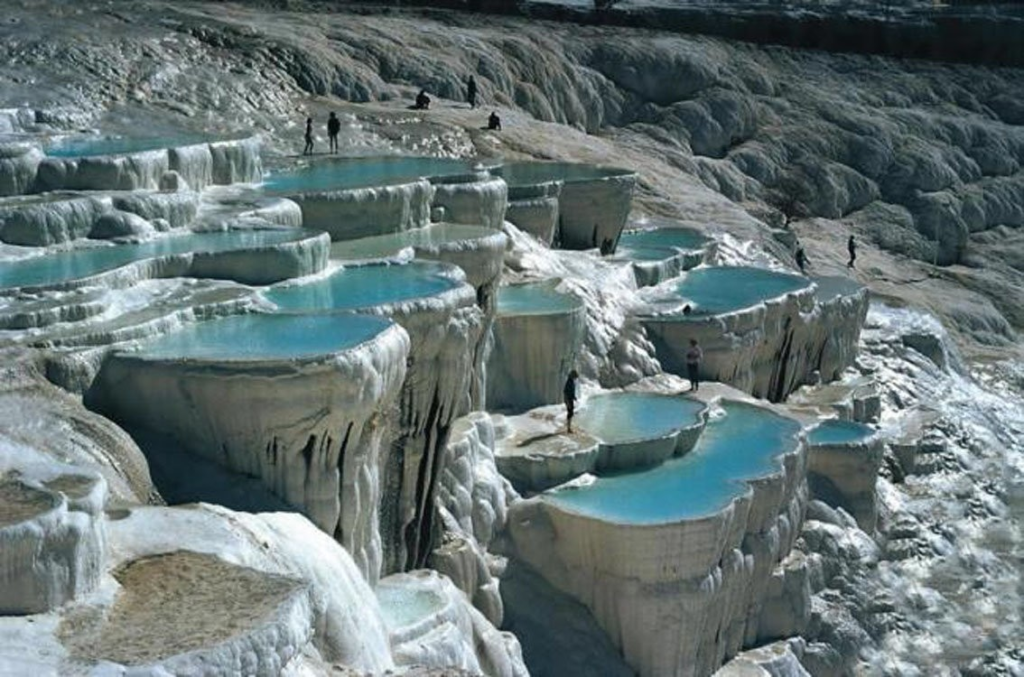
Pamukkale, meaning “cotton castle” in Turkish, is famous for its stunning white travertine terraces formed by mineral-rich thermal waters. Visitors can bathe in the warm, turquoise pools and explore the nearby ancient city of Hierapolis, known for its well-preserved ruins, including a Roman amphitheater and ancient thermal baths. The unique landscape and historical significance make Pamukkale a popular destination for tourists seeking relaxation and exploration.
Ephesus

Ephesus is one of the best-preserved ancient cities in the world, showcasing the grandeur of Roman architecture. The city is home to remarkable ruins, including the Library of Celsus, the Great Theatre, and the Temple of Artemis, one of the Seven Wonders of the Ancient World. Ephesus offers visitors a glimpse into ancient life and culture, making it a significant archaeological site and a UNESCO World Heritage site.
Antalya
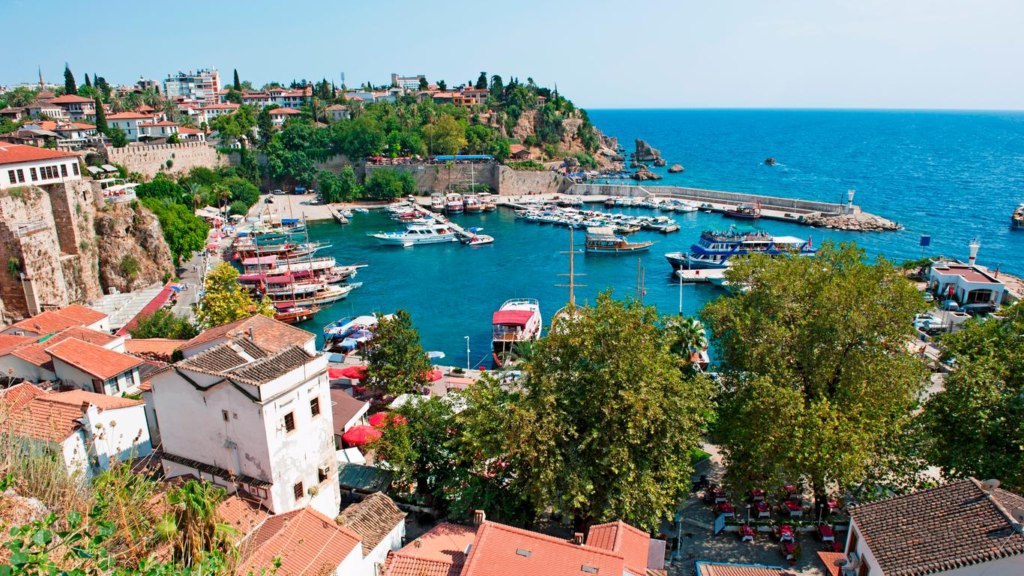
Antalya, located on the southern coast of Turkey, is known for its stunning beaches, turquoise waters, and ancient ruins. The city’s historic old town, Kaleiçi, features narrow cobblestone streets, charming shops, and historic buildings, including the Hidirlik Tower. Visitors can relax on beautiful beaches, explore ancient ruins like the Roman theater of Aspendos, and enjoy the vibrant nightlife and local cuisine.
Bodrum
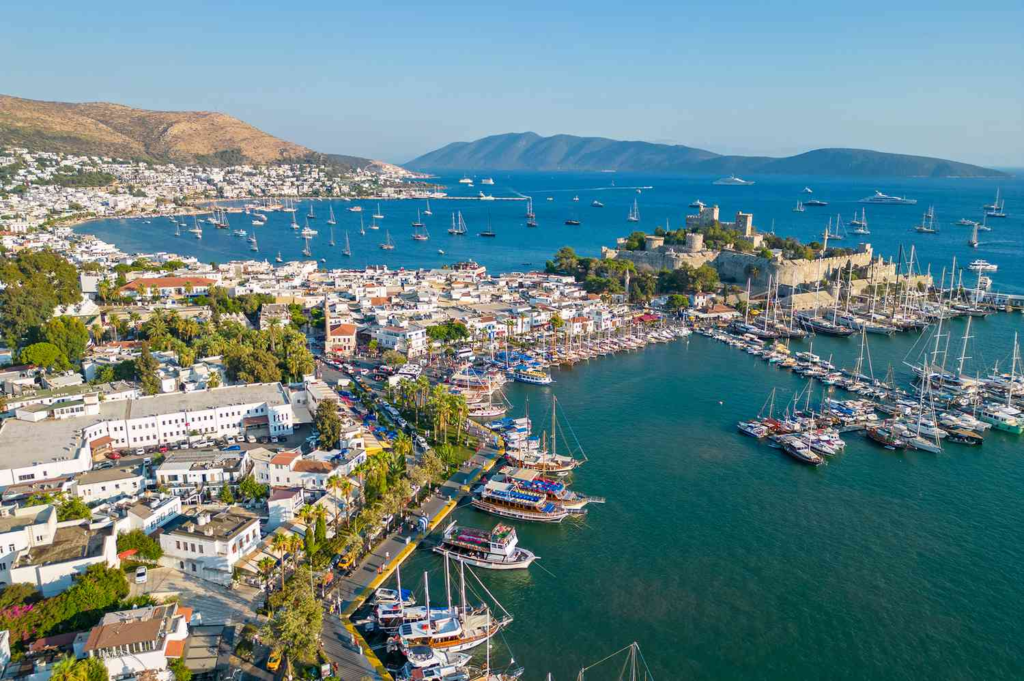
Bodrum is a popular coastal destination known for its lively atmosphere, beautiful beaches, and historic sites. The Bodrum Castle, built by the Knights of St. John in the 15th century, offers stunning views of the harbor. Visitors can explore the ancient ruins of the Mausoleum at Halicarnassus, one of the Seven Wonders of the Ancient World. Bodrum’s vibrant nightlife, trendy restaurants, and water sports make it a favorite destination for travelers.
Göreme National Park

Göreme National Park is a UNESCO World Heritage site known for its unique rock formations and historical significance. The park features ancient cave churches adorned with frescoes, reflecting the region’s Byzantine heritage. Visitors can hike through the stunning valleys, explore the fairy chimneys, and take hot air balloon rides to experience the breathtaking landscape from above. Göreme National Park is a must-visit for nature enthusiasts and history buffs alike.
Mount Ararat

Mount Ararat, the highest peak in Turkey, holds significant historical and cultural importance. It is traditionally associated with the biblical story of Noah’s Ark. The mountain offers stunning views and challenging hiking opportunities for adventurers. The surrounding region is rich in history and natural beauty, making it a popular destination for trekkers and outdoor enthusiasts.
Troy

The ancient city of Troy is steeped in legend and history, known for its role in Homer’s epic tales. Visitors can explore the archaeological site, which includes remnants of various civilizations that inhabited the area over the centuries. The famous Trojan Horse, a symbol of the city’s rich mythology, is a popular attraction. Troy’s historical significance and captivating stories make it a must-visit destination for history lovers.
Safranbolu
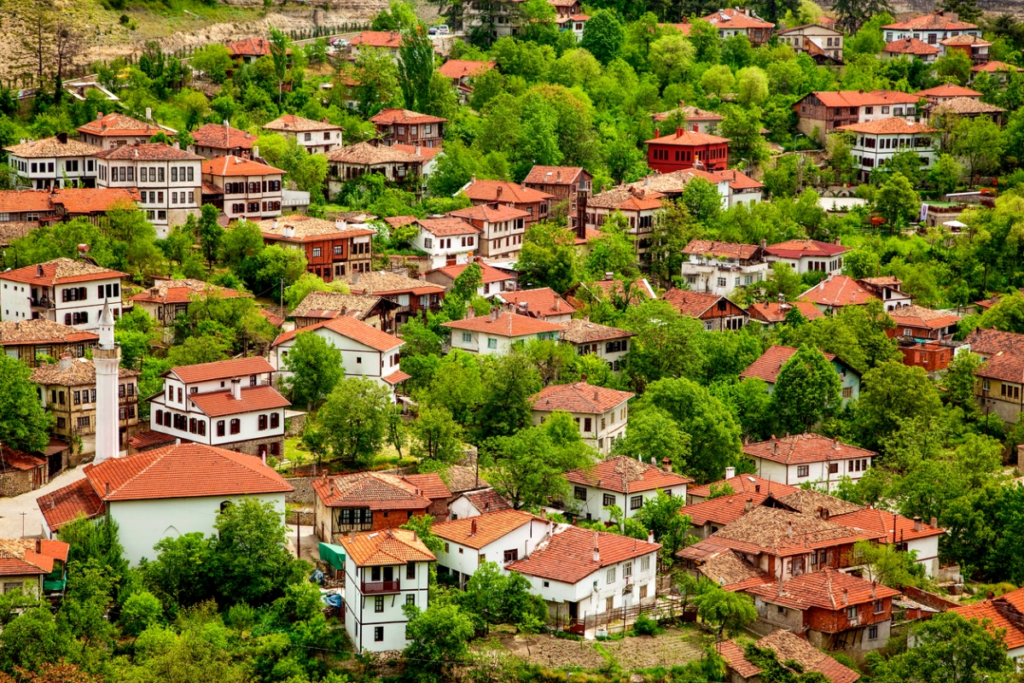
Safranbolu is a UNESCO World Heritage site famous for its well-preserved Ottoman architecture. The town features traditional wooden houses, narrow streets, and charming squares. Visitors can explore the historic bazaars, taste local saffron-infused dishes, and admire the beautiful mosques and fountains. Safranbolu offers a glimpse into Turkey’s rich cultural heritage and is an ideal destination for those seeking a quieter experience.
Culture
The official language of Turkey is Turkish, which is spoken by the vast majority of the population. Turkish belongs to the Turkic language family and has undergone significant changes throughout history. The language has borrowed words from Arabic, Persian, French, and Italian, reflecting the country’s diverse influences. Turkish is known for its unique vowel harmony and agglutinative structure, making it distinct from many other languages.
Turkish lifestyle is characterized by a rich blend of tradition and modernity. Family plays a central role in Turkish culture, with strong ties and close-knit relationships being highly valued. Hospitality is a fundamental aspect of Turkish life, with guests often treated with warmth and generosity. Turkish cuisine, known for its diverse flavors and ingredients, is an essential part of daily life, with meals often enjoyed together as a family.
The country also celebrates various festivals and cultural events throughout the year, showcasing its vibrant traditions and customs. Turkish tea and coffee hold special significance in social gatherings, and traditional arts such as carpet weaving and calligraphy continue to thrive.
Turkey boasts a rich tapestry of traditions and customs that vary by region. Festivals such as Eid al-Fitr and Eid al-Adha are celebrated with great enthusiasm, featuring special prayers, feasting, and communal gatherings. The Whirling Dervishes, representing the mystical side of Islam, perform their mesmerizing dance as part of Sufi rituals.
Traditional Turkish music and dance, including folk dances like the Horon and Zeybek, are integral to celebrations and cultural events. Turkish arts and crafts, such as pottery, tile-making, and embroidery, reflect the country’s rich heritage and continue to be cherished by both locals and visitors.
Festivals
Turkey hosts a variety of festivals throughout the year, celebrating its diverse culture and heritage. One of the most significant festivals is the Istanbul Film Festival, showcasing local and international films. The Whirling Dervishes Festival in Konya pays homage to the Sufi mystic Rumi and features performances of the mesmerizing whirling dance. The International Bodrum Ballet Festival attracts dance enthusiasts from around the world, while the Antalya Golden Orange Film Festival highlights Turkish cinema. These festivals provide an opportunity for locals and visitors to come together and celebrate Turkey’s vibrant culture.
Economy
Turkey has a diverse and dynamic economy, characterized by a mix of agriculture, manufacturing, and services. The country is one of the largest producers of agricultural products, including fruits, vegetables, and grains. The manufacturing sector is
robust, with textiles, automotive, and machinery being significant contributors to the economy. Tourism is a vital sector, attracting millions of visitors each year and generating substantial revenue.
In recent years, Turkey has focused on infrastructure development and investment in technology and innovation to enhance its economic growth. The government aims to diversify the economy, reduce reliance on imports, and promote exports to strengthen its global position.
Tourism
Tourism is a vital component of Turkey’s economy, with millions of visitors flocking to experience its rich history, stunning landscapes, and vibrant culture. The country’s diverse offerings range from ancient archaeological sites to beautiful coastlines and bustling cities. Popular tourist destinations include Istanbul, Cappadocia, Pamukkale, and Antalya, each providing unique experiences for travelers.
The Turkish government actively promotes tourism through various initiatives, including the development of infrastructure, sustainable tourism practices, and the preservation of cultural heritage. As the country continues to attract tourists from around the world, the tourism sector plays a crucial role in supporting local economies and fostering cultural exchange.
Top Eight Most Famous Food of Turkey








Interesting Facts About Turkey
- Turkey is home to the largest ancient city in the world, Troy.
- The country is famous for its delicious baklava, a sweet pastry made of layers of filo dough, nuts, and honey.
- Hagia Sophia in Istanbul was once a cathedral, then a mosque, and is now a museum.
- Turkey is the birthplace of many historical figures, including the philosopher Heraclitus and the mathematician Thales.
- The Turkish flag features a red background with a white star and crescent, symbolizing the country’s Islamic heritage.
- The country is one of the world’s leading producers of hazelnuts, with the majority of its production coming from the Black Sea region.
- Cappadocia’s fairy chimneys are formed through volcanic eruptions and erosion over thousands of years.
- The Bosphorus Strait is the only waterway in the world that separates two continents, Europe and Asia.
- Turkish delight, or lokum, is a traditional confectionery that comes in various flavors and textures.
- Mount Ararat, located in eastern Turkey, is believed to be the resting place of Noah’s Ark according to biblical tradition.
Future Perspective
Turkey’s future holds significant potential for growth and development. The government aims to strengthen its economy through investments in infrastructure, technology, and education. As the country continues to embrace modernization while preserving its rich cultural heritage, it is poised to become an increasingly influential player on the global stage. Turkey’s strategic location and diverse offerings in tourism, trade, and innovation will contribute to its ongoing development and position as a vital hub connecting Europe and Asia.
Conclusion
Turkey is a country that beautifully intertwines history, culture, and natural beauty. From its vibrant cities to its breathtaking landscapes, Turkey offers a unique blend of experiences for travelers. As the nation continues to evolve, embracing modernization while cherishing its rich heritage, Turkey remains an inviting destination for those seeking adventure, culture, and a glimpse into the past. With its warm hospitality and diverse offerings, Turkey stands as a testament to the harmony between tradition and progress.

